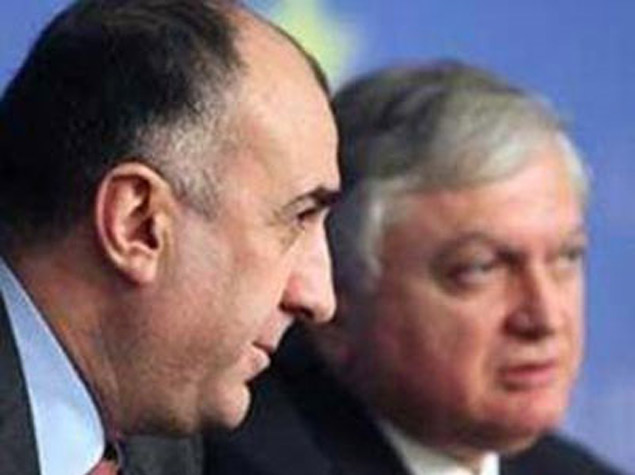Azerbaijani, Armenian FMs to meet in early 2014 for high level talks

By Sara Rajabova
Azerbaijani and Armenian Foreign Ministers agreed to meet again in early 2014 in order to facilitate further talks at the highest level.
The meeting will be held under the auspices of the Minsk Group co-chairs.
The sides came to an agreement at the 20th OSCE Ministerial Council meeting held in Kyiv on December 5, the OSCE website reported.
The heads of the OSCE Minsk Group co-chairs delegation and Azerbaijani and Armenian Foreign Ministers voiced commitment to working together for a peaceful resolution of the Nagorno-Karabakh conflict.
Russian Foreign Minister Sergei Lavrov, Minister for European Affairs of France Thierry Repentin, U.S. State Secretary's Assistant for European and Eurasian Affairs Victoria Nuland, and the Foreign Ministers of Azerbaijan and Armenia Elmar Mammadyarov and Edward Nalbandian agreed to continue working together on a just and peaceful resolution of the Nagorno-Karabakh conflict on the basis of previous achievements.
The co-chair heads of delegation welcomed the recent resumption of high-level dialogue between the Presidents of Azerbaijan and Armenia, and expressed their hope that the upcoming meetings will advance the peace process.
They encouraged the sides to consider measures that would reduce tensions in the region.
Presidents Ilham Aliyev and Serzh Sargsian met in Vienna on November 19, along with the co-chairs of the OSCE Minsk Group.
The Azerbaijani and Armenian Foreign Ministers said people of the region expect and deserve progress in settling the conflict that has lasted far too long, and expressed their appreciation for the mediation of the co-chair countries.
Commenting on the meeting of Azerbaijani and Armenian foreign ministers, Azerbaijani Foreign Ministry spokesman Elman Abdullayev said Azerbaijan will continue its efforts for a just settlement of the conflict based on international norms and also principles, something that is also required by the international community.
Abdullayev said internally displaced people and refugees have waited for more than 20 years for the moment when they can return home.
He said their rights to return home were repeatedly stressed by the OSCE Minsk Group co-chairmen and in resolutions and documents adopted by international organizations.
Abdullayev said the settlement of the conflict will contribute to the restoration of peace and stability in the region and its development.
He added that Azerbaijan has always been guided by the rule of law and international law.
Conflict resolution in focus of OSCE ministerial meeting
The OSCE Ministerial Council meeting in Kyiv put an emphasis on the peaceful resolution of the Nagorno-Karabakh conflict.
OSCE Chairperson-in-Office and Ukraine's Foreign Minister Leonid Kozhara welcomed the Viena meeting between the Azerbaijani and Armenian presidents, adding that OSCE supports the Minsk Group's efforts for settling the Nagorno-Karabakh conflict.
Deputy Secretary General for Europe's External Action Service Helga Schmidt also said the European Union is sorry that despite the efforts made for settling the conflicts in the OSCE member states, no significant progress has been achieved.
Schmidt said unfortunately little progress has been achieved despite the efforts made for settling the conflicts.
She also said the EU supports the efforts of the OSCE Minsk Group in this regard.
Victoria Nuland urged the OSCE countries to support the resumption of dialogue between the presidents of Azerbaijan and Armenia on the Nagorno-Karabakh conflict.
Nuland said dialogue between the leaders of the two countries involved in the Nagorno-Karabakh conflict is the best hope for sustainable peace.
She went on to say that residents of the both countries have waited for the restoration of peace and stability in the region for a long time.
Sergey Lavrov, in turn, noted that Moscow will continue promoting rapprochement between the two sides of the conflict on the basis of the principles proposed by the presidents of the three co-chairing countries.
Lavrov said Russia believe the initiative proposed earlier on establishing a conflict prevention mechanism within the OSCE is important.
Addressing the meeting, British State Minister for European Affairs David Lidington said the OSCE member states believe that political will is necessary for solving conflicts within the organization.
Lidington said the political will is necessary for taking real steps in resolving the Nagorno-Karabakh conflict, as well as other territorial disputes in OSCE space.
In turn, Mammadyarov said the regional stability cannot be achieved without settlement of territorial conflicts in the OSCE area.
He said Azerbaijan hopes that the Roadmap suggested by the incoming Swiss and Serbian Chairmanships will provide an ample opportunity to register progress in most problematic areas such as resolution of protracted conflicts and arms control.
Azerbaijan believes that basic principles as they reflected in the joint statement of the presidents of Minsk Group co-chairmen countries in L'Aquilla in 2009 could serve as a basis for opening substantive talks on comprehensive peace agreement.
He said the political will is necessary for taking real steps on resolution of the Nagorno-Karabakh conflict, as well as other territorial disputes in the OSCE area.
The Nagorno-Karabakh conflict emerged in 1988 when Armenia made territorial claims against Azerbaijan. Since a lengthy war in the early 1990s that displaced over one million Azerbaijanis, Armenian armed forces have occupied over 20 percent of Azerbaijan's internationally recognized territory, including Nagorno-Karabakh and seven adjacent regions.
The UN Security Council's four resolutions on Armenian withdrawal have not been enforced to this day.
Peace talks, mediated by Russia, France and the U.S. through the OSCE Minsk Group, are underway on the basis of a peace outline proposed by the Minsk Group co-chairs and dubbed the Madrid Principles. The negotiations have been largely fruitless so far.
